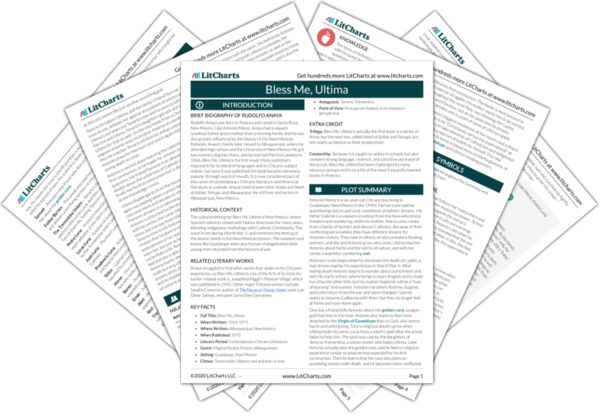Summary
Analysis
Antonio wakes up to the white sun and finds that Ultima's potion has healed his cuts. He thinks about Lupito's soul and wonders if it is in hell, Purgatory, or wandering like la Llorona. Lupito committed a mortal sin, so he is probably in hell. Antonio hopes that God would forgive him, but God doesn't forgive anyone. He wonders if his father fired at Lupito.
Antonio's preoccupation with sin and punishment takes full hold here. He is still processing the world through a Catholic framework, and so he sees the rules of life as strict and unyielding.
Themes
It is Sunday morning, when his parents always argue, as Gabriel drinks Saturday nights and argues about religion. He curses the town that took him from the llano and makes fun of priests as wearing skirts. There is a rumor that once Gabriel beat up a priest for preaching against something his father had done. María believes that farmers led by a priest is the rightful order. The Lunas were once led by a priest, and she hopes that the people will turn back to the earth and Antonio will be their priest once more. Antonio wonders how such contradictory people got married, but the family remains a happy one.
The conflict between María and Gabriel again shows the culture tension within Antonio. María's religious outlook imposes a clear order on the world – she wants Antonio to continue and fulfill that order by becoming a priest and farmer. Gabriel, however, idealizes independence above all else, and has a special aversion for priests. The fact that these two opposite people got married—and despite their arguments that the marriage is largely stable—symbolizes the "marriage" of cultures within the Chicano identity.
Themes
They get ready for church and Ultima asks how Antonio is doing. María scolds him for not greeting Ultima formally enough, but Ultima says that last night was hard for all the men. María says Antonio (she calls him Tony) is still a baby, but Ultima says he will soon be a man. María argues that it is a sin for a boy to grow up, but Gabriel responds all his experiences will build him up into a man. María hopes aloud that Antonio will become a priest and so avoid the corruption of the world. Antonio feeds the rabbits and tries not to think about Lupito.
Ultima, like Gabriel, wants Antonio to become an independent person and make his own moral choices. She sees a sense of independence and identity as more important than what that identity turns out to be. María, on the other hand, clings to Antonio's youth and wants to both save his soul from corruption (by making him a priest or keeping him from growing up) and keep him by her side forever.
Themes
They get ready for mass and María and Ultima wear black because so many families are mourning sons and husbands lost in the war. Antonio realizes that the war also took Lupito and the sheriff. As the family walks down the road people whisper about Ultima, and someone calls her a bruja, or witch.
The war again encroaches on the secluded community of the novel. This is the first time Anaya shows Ultima among the outside world, and the prejudice against her mysterious powers is rampant.
Themes
Get the entire Bless Me, Ultima LitChart as a printable PDF.

Antonio asks Ultima about his father's soul and how he can take communion if he killed a man last night. Ultima responds that she doesn't think Gabriel fired at Lupito, but also that Antonio must not presume to know what God forgives. Antonio asks many questions but Ultima says he must be patient. They pass a brothel owned by a woman named Rosie, which Antonio has heard is an evil place, but evil in a different way from witches. The bells ring for Lupito as they approach the church.
Ultima does not force Antonio into any set of morals or tell him what to think, but instead shows him how his father made a complex moral decision. Antonio is still preoccupied with the Catholic rules of punishment, but Ultima begins to instill a sense of moral independence in him. Antonio's insatiable curiosity is answered with Ultima's far-reaching wisdom in saying that knowledge comes only from experience (which is somewhat at odds with Catholicism, which locates the source of knowledge in Catholic law and the Priest as opposed to in individuals).
Themes
Antonio goes around the side of the church to wait with some older boys from town. Ernie, Horse, Bones, the Vitamin Kid, Abel, and Florence argue about Lupito, curse, and fight. Horse and Bones are wild and unpredictable, the Vitamin Kid is unbeatably fast, and Florence is blonde and an atheist. Horse tries to wrestle Antonio but Antonio knows his tricks and flips him on his back. He is afraid Horse is going to beat him up, but then Horse laughs and welcomes Antonio to the group.
The gang of boys acts as comic relief throughout the novel, but also serves as a prism for their society – here they are preoccupied with the violence of Lupito and the sheriff's death. They also represent the kind of mindless rowdiness expected in adolescence, and so they contrast with Antonio's thoughtful inner struggles and desire for answers.
Themes












